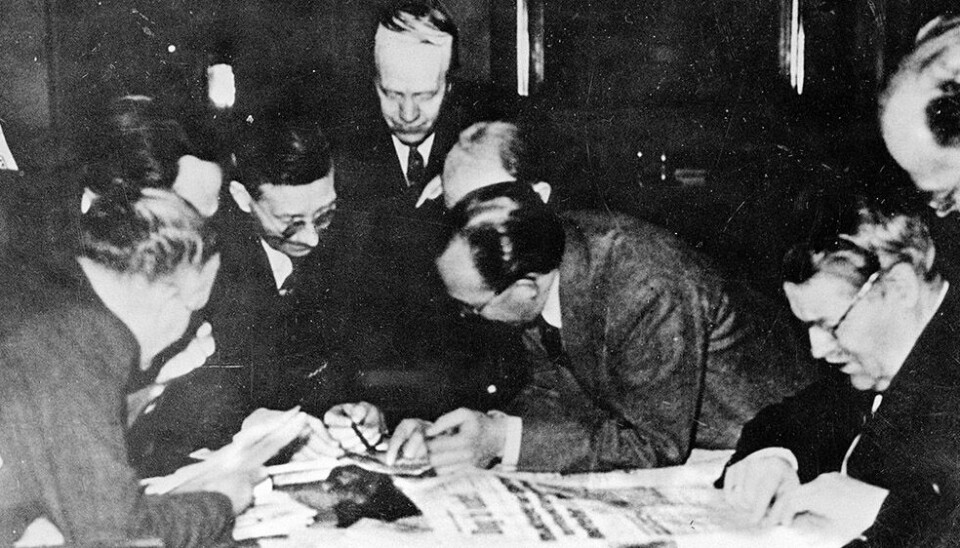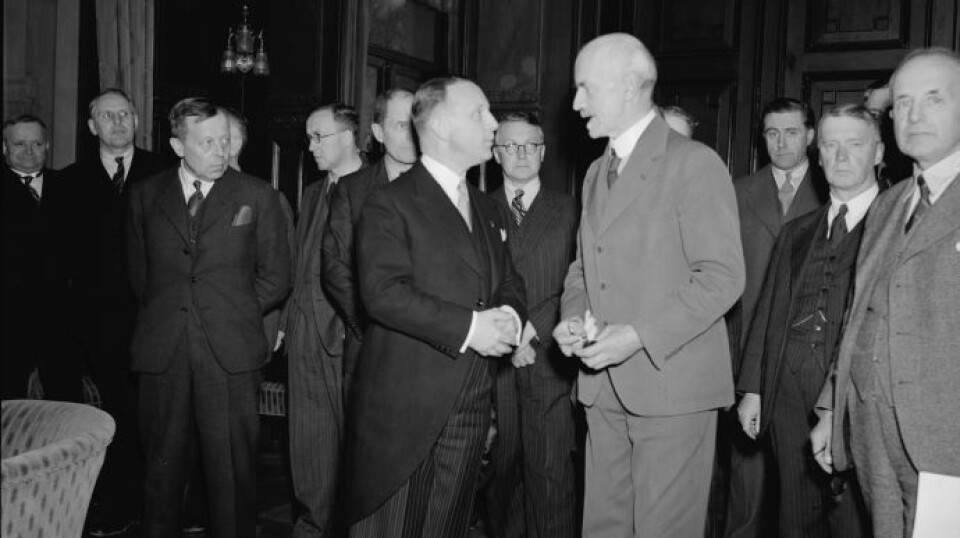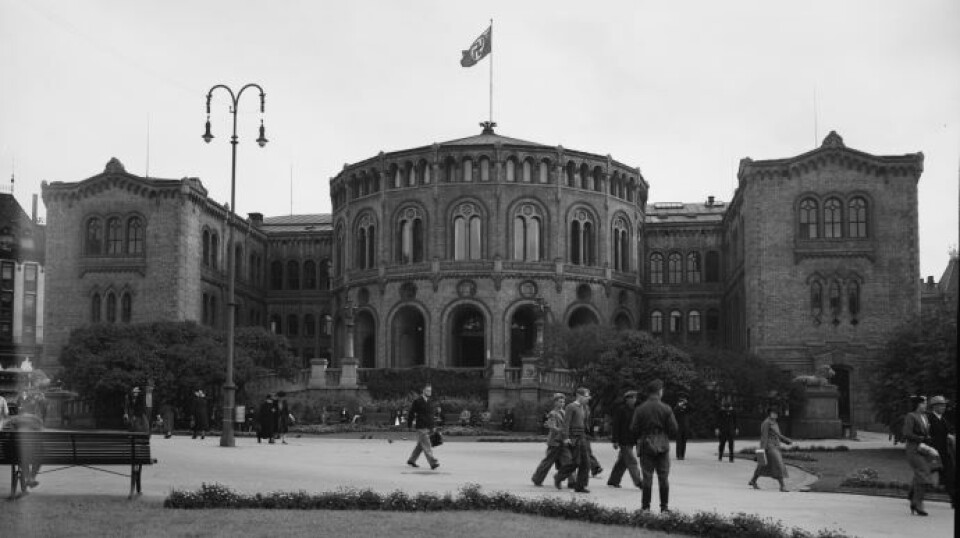THIS ARTICLE/PRESS RELEASE IS PAID FOR AND PRESENTED BY University of Oslo - read more

Norway in 1940: The parliament was willing to sacrifice King and government
During World War II, the Presidium of the Norwegian parliament was hoping to strike a deal with Nazi Germany. Historian Øystein Sørensen has been trying to understand why.
“It is easy to moralise with the wisdom of hindsight. But I think it is more interesting and fruitful to try to see things from the point of view of the people who in 1940 had no idea what the future would bring,” Øystein Sørensen says.
He is a professor of history at the University of Oslo.
In his book Svik 1940? (Betrayal 1940?), Sørensen writes about the Norwegian parliament (Stortinget) and its leaders – the Presidium. In 1940, they were on their own in Norway after both the government and the King had fled the country.
They remained the legal authorities, but they could not govern in Norway during the occupation.
The country was occupied by Nazi Germany, and during the so-called Council of the Realm negotiations from June to September 1940, the Presidium negotiated with the Germans for a political solution for Norway.
During these negotiations, the Presidium – and many other Norwegians – were willing to sacrifice both the King and the government in order to come to an agreement.
“This is a less honourable episode in recent Norwegian history, not least compared with our proudest moments, such as 1814,” says Sørensen.
The verdict in retrospect
In retrospect, the actions of these politicians have frequently been condemned – first by the Commission of Inquiry of 1945, which was set up immediately after the war.

“I have tried to look at these events objectively, without making any moral judgements. Instead, I have sought to understand and explain,” Sørensen says.
He is very familiar with the history of the occupation of Norway. However, in his work on this book, he has read even more, including texts from numerous archives and other sources.
Could Germany win the war?
“Before the war broke out in 1939, France and Germany had reasonably similar military capacity. Germany had spent four years waging an exhausting trench war against France during World War I without getting anywhere,” says Sørensen.
But in June 1940, France was defeated by Nazi Germany in a matter of weeks.
“It was unbelievable. And this happened at exactly the same time as the Presidium was negotiating a deal with the German occupying forces. They must have thought there was a fairly good chance that Germany might win the war. In that case, it would be out of the question for Norway’s government and royal family to return,” he says.
At the same time, if Germany were not to win, the Norwegian negotiators probably wanted to ensure the best possible situation for as long as the occupation lasted, Sørensen argues.
“They wanted to defend Norway’s democratic institutions and try to avoid a pure Nazi regime. To that end, they were willing to sacrifice the King and the governmen,” he says.
Vidkun Quisling was to leave the country
After the Nygaardsvold Government fled Norway in April, the so-called Administrative Council was established. The Germans wanted this to be a counter-government, but the council insisted on being a purely administrative body for the occupied territories.
The German authorities accepted this for as long as the hostilities lasted. However, after Norwegian military forces surrendered, the Germans wanted a proper government in Norway.

The Presidium finally agreed to ask the King and the goverment to resign in the summer of 1940.
One of the conditions was that Vidkun Quisling would not be allowed to have any power in Norway. The German Reichskommissariat (Commissariat of the Realm) would also be abolished and replaced by a more modest institution.
A long history of compromise
Sørensen believes that Norwegians’ experience and perspective also played a role in their protracted belief that they would be able to reach an agreement with the Germans. From 1814 to 1940, the political culture had been characterised by compromises and a willingness to negotiate.
“Every time there was a crisis or conflict that could potentially escalate, the solution ended up being a peaceful compromise. This was extraordinarily beneficial for Norway. The union with Sweden is one example. By autumn 1814, important elements of what had happened at Eidsvoll on 17 May – the drafting and signing of the new Norwegian constitution – had already started to be compromised,” he says.
In 1814, Denmark had given Norway to Sweden in the aftermath of the Napoleonic wars. This led to protests and the formation of a Norwegian constitution. When Sweden attacked later that summer, the war ended before it had even begun. The solution was a compromise – a union with Sweden.
This was a peaceful and successful arrangement that lasted until the end of the 19th century. Once again, the solution was a compromise: In 1905, Norway was given its independence in exchange for demolishing the newly built fortresses along the border with Sweden.
“Not a single shot was fired. And since then, Norway and Sweden have largely enjoyed good neighbourly relations. The problem in 1940 was simply that Nazi Germany was not Sweden,” Sørensen says.
Goodwill towards Norway?
At that time, no one in Norway knew how far Germany would be willing to go.
“Even though Norwegians knew as early as the summer of 1940 that the Nazis were antisemitic, no one could foresee the Holocaust,” he says.
According to Sørensen, Norway knew that Germany was a brutal superpower, but they still believed it was possible to reach an agreement. At the beginning of the invasion, they had also experienced better treatment than, for example, Poland.

“Norwegian politicians thought they could rely on this apparent goodwill towards Norway. But their beliefs had no basis in reality, as Norway eventually found out,” Sørensen says.
"Don’t make deals with bullies"
It turned out that the deal the Presidium thought they had entered into with the German authorities in June 1940 was only provisional and was not respected by the Germans.
Hitler eventually decided that Vidkun Quisling was to be appointed as Minister President of Norway. In addition, the Council of the Realm, which was intended to be a non-Nazi Norwegian government that cooperated with the Germans, ended up bringing in more and more representatives from the Nazi party, Nasjonal Samling.
After repeated attempts at negotiations, talks finally broke down in September, and the occupation entered a new stage.
Sørensen believes that there are several lessons to be learned from this part of Norwegian wartime history. One of them is this: Do not compromise with a party that refuses to accept overarching rules of the game.
“In terms of military power, Sweden was much stronger than Norway in 1905, but they honoured the agreement the two nations had reached. Nazi Germany did not. It doesn't seem that Russia does so today either. Once you realise that you are dealing with a brutal bully, great caution should be exercised when accepting negotiations and compromises,” he says.
Reference:
Øystein Sørensen. Svik 1940? (Betrayal 1940?), Dreyer Forlag, 2023. ISBN: 9788282656627

This article/press release is paid for and presented by the University of Oslo
This content is created by the University of Oslo's communication staff, who use this platform to communicate science and share results from research with the public. The University of Oslo is one of more than 80 owners of ScienceNorway.no. Read more here.
See more content from the University of Oslo:
-
Mainland Europe’s largest glacier may be halved by 2100
-
AI makes fake news more credible
-
What do our brains learn from surprises?
-
"A photograph is not automatically either true or false. It's a rhetorical device"
-
Queer opera singers: “I was too feminine, too ‘gay.’ I heard that on opera stages in both Asia and Europe”
-
Putin’s dream of the perfect family




































